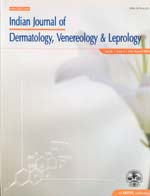
|
Indian Journal of Dermatology, Venereology and Leprology
Medknow Publications on behalf of The Indian Association of Dermatologists, Venereologists and Leprologists (IADVL)
ISSN: 0378-6323
EISSN: 0378-6323
Vol. 77, No. 6, 2012, pp. 673-676
|
 Bioline Code: dv11204
Bioline Code: dv11204
Full paper language: English
Document type: Research Article
Document available free of charge
|
|
|
Indian Journal of Dermatology, Venereology and Leprology, Vol. 77, No. 6, 2012, pp. 673-676
| en |
Therapeutic efficacy and safety of propylthiouracil in psoriasis: An open-label study
Gnanaraj, Pushpa; Malligarjunan, Hemamalini; Dayalan, Haripriya; Karthikeyan, Subashini & Narasimhan, Murali
Abstract
Background: Psoriasis is a common hyperproliferative disorder of the skin associated with
significant morbidity. Most of the drugs used in psoriasis provide only a temporary relief,
whereas they are riddled with potential toxicities and cost concerns. Hence, there is a
constant need to explore newer, effective, orally administered, and cost-effective drugs with
minimal adverse effects. In this scenario, propylthiouracil (PTU), an antithyroid thioureylene
has been shown to be effective in psoriasis which satisfies the above criteria.
Aim: The
objective of our study is to assess the clinical efficacy of PTU in psoriasis.
Methods: A
total of 25 patients with plaque psoriasis were treated with oral PTU for 12 weeks. Clinical
response was assessed using the “Psoriasis Area and Severity Index” (PASI) score. Routine
blood analyses and thyroid function tests were carried out periodically during the study.
Results: Oral PTU produced significant clearing of lesions at 6 weeks and 12 weeks of
the study period in all patients, as demonstrated by the reduction in PASI scores (33.9%
in 6 weeks and 74.1% reduction in 12 weeks). Four patients experienced near complete
clearing of the lesions. One patient developed mild elevation of liver enzymes which
reversed on withdrawal of PTU. None of the patients had hypothyroidism or cytopenias.
Conclusion: PTU significantly clears the lesions in psoriasis with minimal adverse effects.
Hence, it can be considered as a therapeutic option in psoriasis, especially when the standard
drugs cannot be used due to their toxicities or forbidding cost.
Keywords
Antithyroid agents, hyperthyroidism, hyperproliferation, propylthiouracil, psoriasis
|
| |
© Copyright 2011 Indian Journal of Dermatology, Venereology, and Leprology.
Alternative site location: http://www.ijdvl.com
|
|
